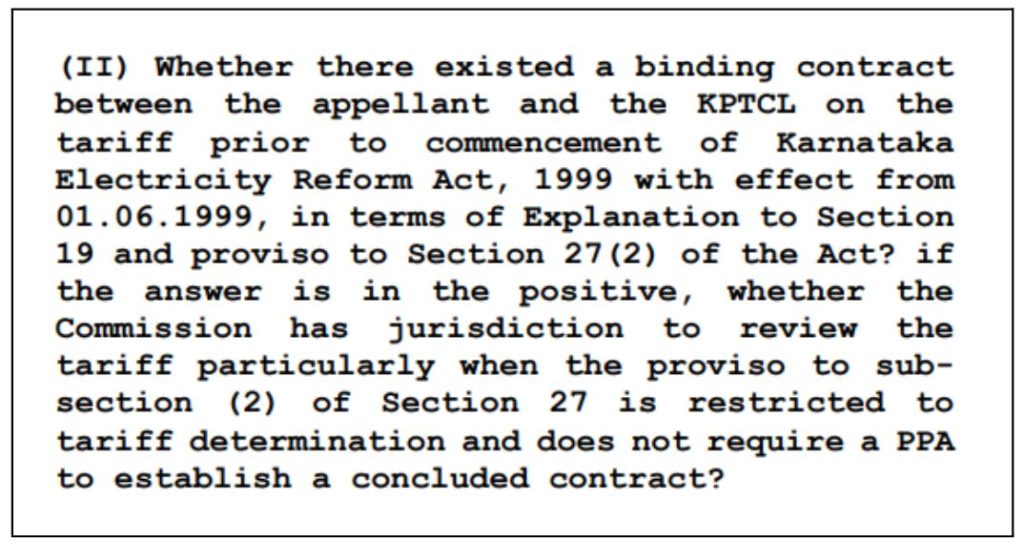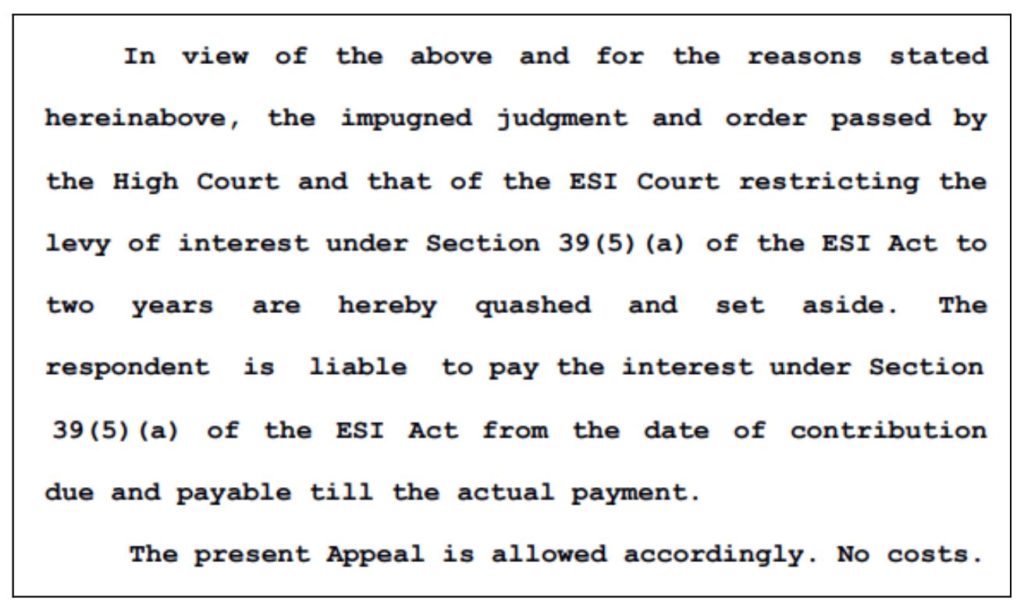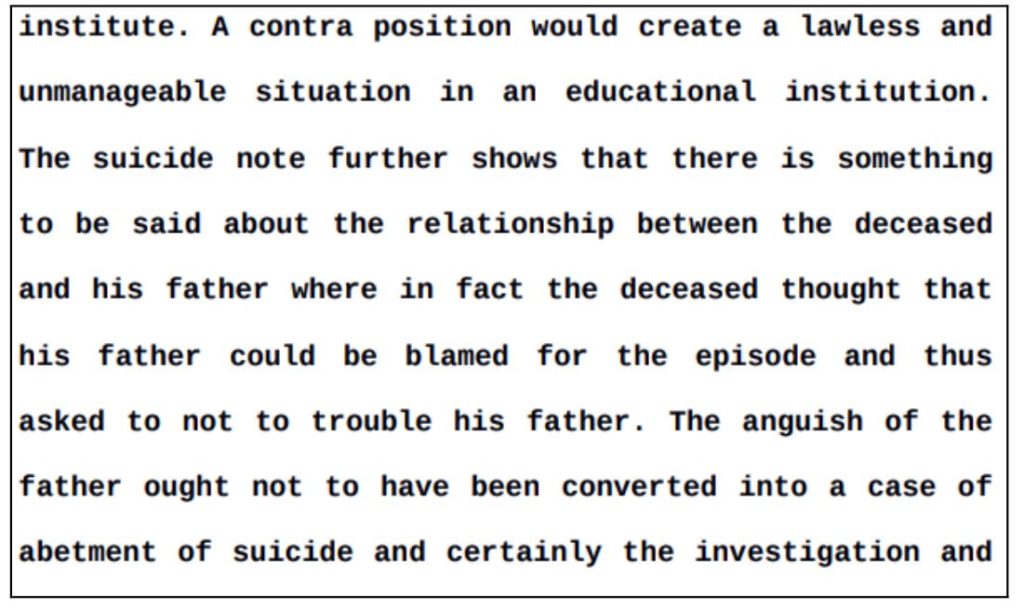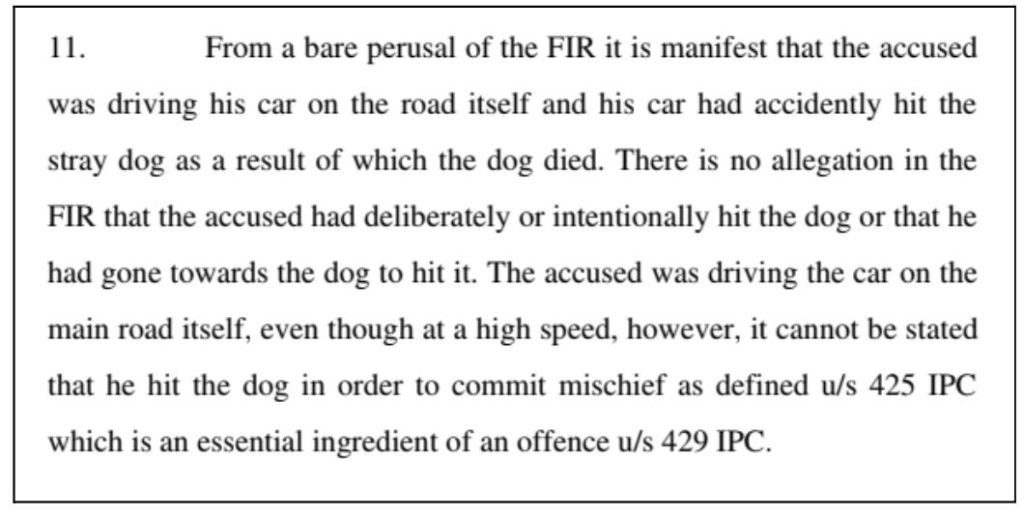In this week’s review of Court Judgments, we look at Supreme Court’s clarification that a contract can be said to be concluded only if parties are ad idem on all the essential terms, SC’s ruling that no authority can reduce or waive the interest under ESI Act, and that legitimate disciplinary action by teachers is not abetment of suicide.
SC: A contract can be said to be concluded only if parties are ad idem on all the essential terms
In the case Karnataka Power Transmission Corporation Limited vs. JSW Energy Limited, Karnataka Power Transmission Corporation Limited (KPTCL) filed an appeal in the Supreme Court against an order passed by the Karnataka High Court.
Karnataka government had permitted JSW Energy Ltd. cortex gas/coal based thermal power plant at Bellary and Jindal Vijayanagar Steel Limited (JVSL) was to consume the power produced from the thermal plant. The Central Electricity Authority granted the required technical economic clearance in March 1996. The Karnataka State Electricity Board (KEB) entered into a heads of term with JTPCL which was followed up by a wheeling and banking agreement between the two. The parties in the case made a draft power purchase agreement in 2000.
A letter was sent to the Commission to be treated as an application for entering into PPA under the Karnataka Electricity Reforms Act, 1999. Objections were filed by objector based on public notice. JSWL was of the view that the Commission could not examine the PPA since it was a contract which concluded before the Act was implemented and so, the case fell within the four walls of the proviso to sub-section 2 of Section 27 of the Act. The commission also approved a draft PPA with modifications which was challenged by JSW Energy Ltd in the High Court.
The court allowed First Appeal filed by JSW Energy Ltd. and set aside the orders passed by the Commission. The High Court directed the appellant to adhere to the tariff rate specified in the State government’s order from 12 May 1999.
The issue raised before the apex court was whether there was a concluded contract between the parties on the tariff before the Karnataka Electricity Reform Act, 1999 came into effect.

The Apex Court bench of Justices KM Joseph, Aniruddha Bose and Hrishikesh Roy concluded that there was no concluded contract within the meaning of proviso to Section 27 of the Act. It added that a contract can be said to be concluded only when parties are ad idem (in agreement) on all the essential terms of the contract. While partly allowing the appeal, the Bench stated that the subject matter of the contract, the position of the parties, the implications of the working of the contract and the intention of the parties did not persuade the Bench to safely gather that there was a concluded contract upon negotiations and correspondence, culminating in the Government Order dated 12 May 1999.

SC: No authority can reduce or waive the interest under ESI Act
The Employees State Insurance (ESI) Act provides for certain benefits to employees in case of sickness, maternity, and employment injury. Section 39(5)(a) of the Act states that if any contribution payable under this Act is not paid by the principal employer on the date on which such contribution is due, they are liable to pay simple interest at 12% per annum or at such higher rate as per the regulations till the date of its actual payment.
In Regional Director/ Recovery Officer vs. Nitinbhai Vallabhai Panchasara, ESI Court, restricted the levy of interest under the above mentioned Act, to two years only. An appeal was filed by the ESI Corporation against the restriction in the Allahabad High Court which dismissed the same on grounds that no substantial question of law arose. The High Court’s decision has been challenged in the Supreme Court.
The Supreme Court Bench of Justices MR Shah and MM Sundresh observed that both the ESI Court and the High Court did not properly appreciate that the levy of interest under Section 39(5) (a) of the ESI Act is mandatory and neither the Court nor the Authority have any jurisdiction and/or authority to waive the interest. Referring to previous judgements, the Bench allowed the appeal and held that no authority including courts have any authority to either waive the interest and/or reduce the interest and/or the period during which the interest is payable.

SC: Legitimate disciplinary action by teachers is not abetment of suicide
In April 2008, Gaurav Wahi was attending the last lecture of Nitin Shyam. Gaurav is alleged to have misbehaved with him in the class under the influence of alcohol. When the teacher asked the student to leave the class, Gaurav Wahi ran out of the classroom. The teacher informed this to the Head of the Department. A suspension order was passed in the name of the student, who was also asked to bring his parents, as an exercise of legitimate disciplinary action. The student was also asked to deposit some money in the college as security deposit which would be refunded once the course is completed. However, the student ended his life by jumping in the canal. The father of the deceased filed a complaint with the police accusing the teacher, the Head of the Department (HoD) and the principal of instigating the suicide. He also alleged that the teacher ran behind the deceased and dragged him to the HoD’s office.
In V.P. Singh vs. State of Punjab, the accused had filed an appeal in the Supreme Court. Acknowledging the anguish of a father who has lost a young son, the court Supreme Court Bench of Justices Sanjay Kishan Kaul and Hrishikesh Roy held that the father cannot blame the world (in the present case, the institution, and its teachers) for what is a basic disciplinary action taken by the institute. It added that the father’s anguish should not be converted into a case of abetment of suicide. The Court allowed the appeal.

Mumbai Magistrates Court: Women can also be accused of offences intended to outrage another woman’s modesty
In State of Maharashtra vs. Rovena Bhosale, the accused constantly abused the informant verbally for constantly informing everything to the accused’s mother. She would shout at the informant in foul language from her kitchen and quarrelled with her often. One day, the accused started abusing the informant from the corridor and assaulted her. She hit her with chappal, tore her clothes, and asked her husband to rape the informant. She was convicted under sections 323 and 354 of the IPC.
With respect to Section 354 of the IPC, the Metropolitan Magistrates Court in Mumbai stated that an offence under section 354 IPC is not sexual offence but is committed when a person assaults or uses a criminal force to assault another woman intending to outrage or knowing it to be likely that they will thereby outrage her modesty. Such an offence can be conducted by anyone- man or woman. It noted that Section 354 IPC operates equally upon all persons whether males or females and that it cannot be maintained that woman are exempted from any punishment under this section. Thus, women can also be accused of offences intended to outrage another woman’s modesty. The accused was found guilty and sentenced to rigorous imprisonment for one year and fine.
Delhi Sessions Court: Killing a stray dog by accidentally running a car over it is not ‘mischief’ under Section 429 of IPC
In Puneet vs. State of NCT of Delhi, FIR was filed under Sections 428 and 429 of IPC against the accused for killing a dog. He drove a BMW car and killed one stray dog at Mayur Vihar, Delhi when the traffic signal was red. His car went over the dog twice. He was accused of driving in full speed and not stopping when the complainant tried to stop him. The incident took place in June 2019.
Additional Sessions Judge Deepali Sharma heard the case and held that it was essential to prove the offence of ‘mischief’, which is the main ingredient of Section 429 for which it is necessary to establish that the accused had the requisite intention or knowledge to cause wrongful loss or damage to public or person. The court noted that there was no allegation in the FIR that the accused had deliberately or intentionally hit the dog or that he had gone towards the dog to hit it. It held that the accused was driving on the main road at high speed and so, it cannot be stated that he hit the dog to commit mischief as defined under Section 425 of IPC which is an essential ingredient of an offence under section 429 of IPC. The accused was discharged of charges under Section 429 of IPC.



